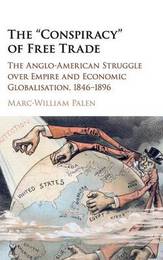
|
The 'Conspiracy' of Free Trade: The Anglo-American Struggle over Empire and Economic Globalisation, 1846-1896
Hardback
Main Details
| Title |
The 'Conspiracy' of Free Trade: The Anglo-American Struggle over Empire and Economic Globalisation, 1846-1896
|
| Authors and Contributors |
By (author) Marc-William Palen
|
| Physical Properties |
| Format:Hardback | | Pages:334 | | Dimensions(mm): Height 237,Width 156 |
|
| Category/Genre | International trade
Development economics
Economic history |
|---|
| ISBN/Barcode |
9781107109124
|
| Classifications | Dewey:382.9 |
|---|
| Audience | | Professional & Vocational | |
|---|
| Illustrations |
15 Halftones, unspecified; 15 Halftones, black and white
|
|
Publishing Details |
| Publisher |
Cambridge University Press
|
| Imprint |
Cambridge University Press
|
| Publication Date |
9 February 2016 |
| Publication Country |
United Kingdom
|
Description
Following the Second World War, the United States would become the leading 'neoliberal' proponent of international trade liberalization. Yet for nearly a century before, American foreign trade policy was dominated by extreme economic nationalism. What brought about this pronounced ideological, political, and economic about-face? How did it affect Anglo-American imperialism? What were the repercussions for the global capitalist order? In answering these questions, The 'Conspiracy' of Free Trade offers the first detailed account of the controversial Anglo-American struggle over empire and economic globalization in the mid- to late-nineteenth century. The book reinterprets Anglo-American imperialism through the global interplay between Victorian free-trade cosmopolitanism and economic nationalism, uncovering how imperial expansion and economic integration were mired in political and ideological conflict. Beginning in the 1840s, this conspiratorial struggle over political economy would rip apart the Republican Party, reshape the Democratic Party, and redirect Anglo-American imperial expansion for decades to come.
Author Biography
Marc-William Palen is a historian of empires and globalization at the University of Exeter, and a Research Associate in US Foreign Policy at the US Studies Centre, University of Sydney. Other publications include articles in Diplomatic History, the Journal of Imperial and Commonwealth History, the Historical Journal, Civil War History, the Journal of the History of Economic Thought, and the Journal of the Civil War Era. He is the editor of the popular blog Imperial and Global Forum. He teaches courses on the British and American empires, focusing on the imperial roots of modern globalization. He has been awarded fellowships from the Society for Historians of American Foreign Relations, the US Studies Centre at the University of Sydney, the History of Economics Society, Smith College, Massachusetts, the Historical Society of Pennsylvania, the Massachusetts Historical Society, the New York Public Library, and the Government of Canada.
Reviews'In this boldly argued and richly detailed study, Marc-William Palen shows us why we should know much more than we do about the debate over the tariff in the nineteenth century. The 'Conspiracy' of Free Trade demonstrates how questions of tariffs and trade were ideologically charged and central to American conceptions of imperialism and global economic integration in the age of British power.' Jay Sexton, University of Oxford 'In this illuminating study, Marc-William Palen cuts across the conventional domestic versus foreign approach to American history, showing the role of trade politics as an instrument of a resurgent and highly influential American economic nationalism in the late nineteenth century. He makes clear the eddying global effects of trans-Atlantic controversies over tariffs upon the shaping of US imperialism and Anglo-American relations.' Ian Tyrrell, University of New South Wales, Australia 'In a US election year thick with controversy over the impact of free trade and globalisation on jobs and wages, Palen's absorbing study of the nineteenth-century version of these debates is timely. The Exeter University historian contrasts the British commitment to free trade with what were the then dominant currents of US economic nationalism and protectionism.' Tony Barber, Financial Times 'The 'Conspiracy' of Free Trade ... is a corrective to decades of historiography that laissez-faire doctrine guided the Gilded Age. On the contrary, Palen's sophisticated look into Anglo-American dialogue and domestic political maneuverings show that 'ideological conflict between free traders and economic nationalists laid the imperial path for Anglo-American economic globalization' ... His archival research is solid, though far surpassed by the extensive treatment of periodical and secondary sources; Palen has mined seemingly every commentary on the half century he covers.' Thomas Zeiler, E-International Relations (www.e-ir.info) 'Palen marshals considerable resources to challenge the Revisionist 'OpenDoor imperialism' thesis, and his work is deeply engaged with decades of secondary literature on trade policy and Anglo-American relations.' Nicole M. Phelps, Diplomatic History 'This is a fascinating story, and its one that Palen tells with admirable clarity and concision. Each of the nine main chapters deals with a different, and often quite diverse, subject, but the central organising theme of Cobdenite-Listian conflict remains always in focus.' Daniel Peart, H-Diplo Roundtable Review 'This is an expansive and impressive achievement. For scholars of the Gilded Age and Progressive Era with interests in the political economy of empire, Palen's observations ought to be the new starting place.' April Merleaux, Journal of the Gilded Age and Progressive Era 'Based on a voluminous and thorough use of primary and secondary sources, The 'Conspiracy' of Free Trade is an important work.' Tom Mertes, The Journal of American History '... provides a thorough chronological study of the positions and clashes between Cobdenites and Listians, is a precious resource for economic and imperial historians. ... for anyone hoping to gain broader understanding of the globalisation debate this book deserves, at the very least, a careful read-through.' Marcin Menkes, Polish Yearbook of International Law 'Palen's study is serious, deeply researched and convincing. ... This book will undoubtedly compel these scholars to re-examine such debates and reflect on how they might alter their own approaches to the study of the American Empire.' Andrew Priest, The English Historical Review
|